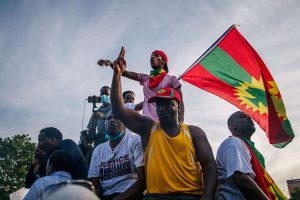
Addis Ababa, the capital of Ethiopia, had this week witnessed deadly protests, bomb blasts and the army being deployed to curb the increasingly violent protests. The chaos followed the murder of popular Oromo entertainer, Hachalu Hundessa, earlier this week. An internet block was also imposed on the country. Demonstrations over Hundessa’s death resulted in 81 people killed.
34 year old Hundessa was popular for his outspokenness. He advocated for the rights of the Oromo. The Mail and Guardian reported this week that the country’s largest ethnic group had been repressed by the Ethiopian government for much of the country’s modern history. Hundessa had wrongfully spent five years in prison after having been arrested at age 17, when the government imprisoned thousands of Oromo.
Businesses and offices in Addis Ababa, reopened on Friday morning, after the city’s mayor addressed residents on Thursday evening, urging them to return to work.
The BBC reports that public transport has also resumed, but there remains a heavy security presence on the streets.
Hundessa’s funeral was held on Thursday in Ambo, his hometown in the Oromia region. Two people died in scuffles with security forces at the heavily policed funeral. The BBC reports that the singer’s death has increased political and communal tensions across Ethiopia.
The internet block since Tuesday has affected the release of COVID-19 statistics which were released on a daily basis prior to July 1.
Three TV channels accused of instigating ethnic tensions and attacks have been shut. They continue, however, to broadcast from other studios. The owner of one of them, Oromia Media Network (OMN), Jawar Mohammed was arrested. He is a member of the Oromo Federalist Congress opposition. Journalist Eskinder Nega was also arrested on suspicion of “instigating chaos”. He has been accused of sending out groups of youngsters to create anarchy.
Several people have been arrested for Hundessa’s murder.
Umm Muhammed Umar







0 Comments